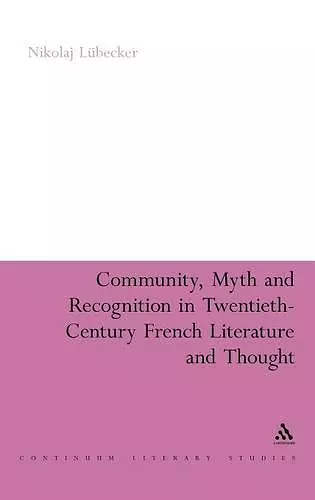Community, Myth and Recognition in Twentieth-Century French Literature and Thought
Format:Hardback
Publisher:Bloomsbury Publishing PLC
Published:19th Nov '09
Currently unavailable, and unfortunately no date known when it will be back

Monograph analyzing the relationship between literature, thought and community in mid-20th century France.
Taking as its point of departure the notion of community in mid-twentieth century French literature and thought, this study seeks to uncover the ways in which Breton, Bataille, Sartre and Barthes used literature and art to engage with the question of reconceptualizing society.Taking as its point of departure the notion of community in mid-twentieth century French literature and thought, this ambitious study seeks to uncover the ways in which Breton, Bataille, Sartre and Barthes used literature and art to engage with the question of reconceptualizing society. In exploring the relevance these writings hold for contemporary debates about community, Lubecker argues for the continuing social importance of literary studies. Throughout the book, he suggests that literature and art are privileged fields for confronting some of the anti-social desires situated at the periphery of human rationality. The authors studied put to work the concepts of Thanatos, sado-masochism and (self-)sacrifice; they also write more poetically about man's attraction to Silence, the Night and the Neutral. Many sociological discourses on the question of community tend to marginalize the drives inherent within these concepts; Lubecker argues it is essential to take these drives into account when theorising the question of community, otherwise they may return in the atavistic form of myths. Moreover if handled with care and attention they can prove to be a resource.
"With Community, Myth and Recognition in Twentieth-Century French Literature and Thought Nikolaj Lubecker has given us a remarkably lucid account of the logics at work in a series of crucial moments of French cultural and intellectual history. Finally we have an analysis that clarifies Breton and Bataille's respective roles in the Contre-attaque movement and justly emphasises the hirtherto under-researched influences of Sorel and Kojève. We are also offered a nuanced, insightful and long overdue study of the post-war 'morality of revolt' articulated in the interchanges between Breton and Bataille. Then a re-evaluation of Sartre, who turns out to be a much more interesting thinker than current orthoxies would have us believe, and finally a tremendously original and elegant reading of Barthes, including of his meditation on 'how to live together'. Lubecker's careful, subtle and sympathetic voice is an excellent guide over this terrain." - Professor Patrick ffrench, French Department, Kings College London, UK
‘This is a courageous and refreshing defence of aesthetic experience, compellingly argued through rigorous readings of some of the most important French intellectuals of the last century.' -- Modern and Contemporary France
In this intricate and carefully crafted piece Nikolaj Lubecker examines the means by which Bataille, Breton, Sartre, and Barthes seek to explore, (re)define, and establish social engagements... Lubecker's reading of Barthes is particularly original, insightful and adept this is a lucid and at times highly original piece. -- French Studies vol 65, issue 3
ISBN: 9780826438300
Dimensions: unknown
Weight: unknown
188 pages